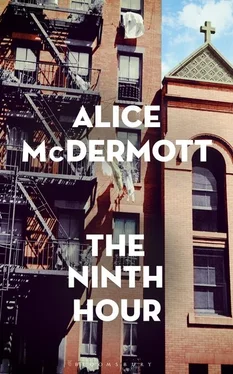* * *
THE BABY, a daughter, was born in August, just three weeks after the old nun died. She was called Sally, but baptized St. Saviour in honor of the Sister’s kindness that sad afternoon. That damp and gray afternoon when the pilot went out. When our young grandfather, a motorman for the BRT whose grave we have never found, sent his wife to do her shopping while he had himself a little nap.
OUR FATHER RODE sitting upright in the high baby carriage, like a boy in a small boat. It was his first memory. Displaced as he’d been from the shade under the perambulator’s hood, occupied now by yet another bundled infant, he spread out his arms and clutched the sides of the carriage: a boy in a storm-tossed rowboat. His mother, pushing the thing, was behind him. She navigated the broken sidewalks, the curbs, and the street crossings with a banging determination that caused the whole contraption—high wheels and springs and the hard black body of the carriage itself—to shudder and quake, rearing at the curbs, bucking at the cobblestones, swinging left or right around poky pedestrians, dog droppings, the spilled contents of fruit markets, dry-goods stores, garbage cans. He rode every undulation, every swerve, with his spine straight, his arms outspread, and his hands fixed tightly around the gunwales of the carriage bed. He looked straight on. There were trees and cars, dustbins and lampposts on the left; on the right, buildings, gray stone and brick, with stoops and children and speared fence tops, but he kept his eyes glued to the horizon that began just above the arc of the black hood, focusing on the world ahead like a sea captain navigating an ice storm. He was petrified.
At his back, his mother out for a stroll. Although the word hardly accommodated her perpetual haste, her determined plowing-through. Beside her, his brother trotted along, holding on to her skirt. She leaned her weight against the handlebar and brought the front of the carriage up in the air—he was tipped backward and the horizon became treed—and then she lifted the back wheels—tipping him forward, a hint of gray sidewalk aiming for his skull—as they mounted another curb. Now shade covered them all, as if there had been a lowering of clouds, and she slowed her pace. Smoothly, shadowy, another baby carriage, the silent black ghost galleon he knew somehow had been following them all the while, pulled alongside. He heard his mother’s voice, and the answering voice of another woman, as they passed into the smooth stream of the park. The conversation itself, an ongoing exchange, rippled with laughter, another smooth stream. It did not soothe him. He kept his back straight, his fingers locked on the edges of the carriage bed. He looked ahead, aware only peripherally of the other strollers, the passing trees and shade, the shadows of the perambulators and of the two women pushing them. He remained vigilant.
There was the duet of the women’s voices, some birdsong, the faint cawing of a crow or a cat. Every once in a while, despite the curbless paths, the carriage beneath him shuddered abruptly—a jiggling, a pause, a jiggling again. He tightened his grip, braced his arms. He peered down a tarred lane of dappled sunlight, a busy sidewalk at the far end. And then the slowing of the wheels. The sound of cat or crow was not distant at all but rose from beneath the black hoods of the two carriages. In tandem, the women, his mother and her silhouetted friend, paused. His mother walked past him, his older brother still attached to her skirt. She leaned down to reach beneath the hood and lifted out a swaddled infant no bigger than a loaf of bread. The other woman did the same. Recently, his mother had been delivered of twins. And then, as she rocked this new scrap of child on her shoulder, and her friend did the same, he turned his head just a few inches more and was met, as if in mirror reflection, with the face of another child, sitting up just as he was, her small hands, as his were, gripping the sides of the black carriage, holding on, holding on. Vigilant like himself, he saw. Erect and terrified, like himself.
She was dressed in white wool: bonnet, coat, and leggings, which was a flaw in the memory, since it must have been high summer. He stared at her, she stared back with wide eyes. He said to himself, There’s the girl I’ll marry.
* * *
IT WAS THE NUNS who got the two mothers walking together. Or Sister Lucy did, anyway. Sister Lucy, who could insist.
She had finagled a lovely baby carriage from a well-to-do couple on President Street, an older couple whose first and only child hadn’t lived past infancy. Then she went with Sister Jeanne to 314, to the doorman’s wife, to say there’s a widow down the street with a new baby. “Put on your hat and go pay her a call.” Still standing at the threshold, Sister Lucy cast an assessing eye around Mrs. Tierney, to the cluttered apartment behind her, then to the chapped cheeks of the baby on her hip, then over the woman herself, who was dressed in a bungalow apron of pale percale, a damp stain, mother’s milk perhaps, on her chest. There was a baby bawling in another room. “Fix yourself up,” Sister Lucy added, “and have a nice visit.”
Mrs. Tierney smiled. She asked for the lady’s name and address. Said she would be certain to visit her sometime soon.
Sister Lucy said, “Why not now? We’ll watch the children while you go.”
At the nun’s side, Sister Jeanne blushed apologetically, shrugged, and then held out her hands to the little boy in Mrs. Tierney’s arms. Mrs. Tierney felt his body, the weight of him, tilt toward the nun as if a magnet drew him.
And then she laughed. Invited the Sisters in.
* * *
GOING TO AND FROM THE PARK—hot weather or cold, snow or stifling humidity, only a hard rain ever kept them indoors—the two young mothers negotiated the crowded streets like impatient empresses. Together, they returned Elizabeth Tierney’s boys and the twin girls to her apartment and then together carried both unwieldy carriages up the steep stone steps. Let other mothers park their baby carriages in alleyways and courtyards, beside garbage cans and under stairs. Not these two.
Compared to Annie’s sparse rooms, Mrs. Tierney’s place was a carnival of cribs and trundle beds, clothes and washbins and dirty plates. Each morning, the dining room table was filled with sticky glasses and piled saucers and ashtrays crowded with cigarette butts and cigar stubs, because Michael, her husband, liked a gathering of men in the evening. “His cronies,” Mrs. Tierney called them—his coworkers mostly, doormen and bellhops and waiters who hailed, she said, from “all corners of the earth.” “The more the merrier,” she said. Despite the mess of glasses and plates, the lingering smell of cigar smoke that competed with the odors of wet laundry and dirty diapers, she said it with the same amused, eye-rolling fondness that she applied to everything that had to do with her husband, who was no immigrant himself but the well-spoken son of a schoolteacher from up near Poughkeepsie. Whose family had disowned him, she said, for “coming down in the world” to marry her.
With the two big black carriages secured in the narrow hallway of Elizabeth Tierney’s apartment and her babies settled into them once more, Annie and her daughter left the jumbled household each morning for the peace and the order of the Little Nursing Sisters’ convent, where she had been given work in the basement laundry.
Sister St. Saviour had arranged it. Before her last illness, the old nun had slipped a note beneath the feet of the Virgin—via her statue in the convent’s front garden—requesting that sufficient funds be found to pay the girl’s salary. “Somehow, dear Mother.” The women of the convent’s Ladies Auxiliary found the note—they checked the statue daily—and presented the petition to their members. The Ladies Auxiliary of the convent of the Little Nursing Sisters of the Sick Poor, Congregation of Mary Before the Cross, consisted mostly of idle Catholic women married to successful men. As Sister St. Saviour well understood, they felt a particular there-but-for-the-grace-of-God affinity for impoverished young widows.
Читать дальше










